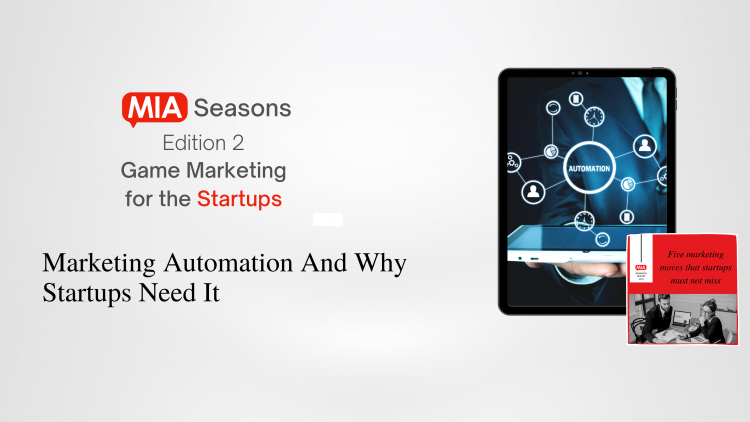Marketing automation is a set of software tools that automate repetitive tasks and free up time for marketers by helping them manage the customer lifecycle by minimising human action and still making it more personal for the customers. Automation is not replacing traditional marketing activities like email campaigns, social media posts or website content updates. Instead, it is just automating the some of the processes and its distribution to the proper channels in a timely manner.
Benefits of Marketing Automation?
The goal is to make it easier for marketers to execute their work and increase efficiency, and automation helps marketers manage campaigns more efficiently and effectively by:
– Streamlining processes: Marketing automation software can be used to create automated workflows that help marketers efficiently execute campaigns.
– Personalising workflows: By using automation platforms, marketers can personalise the workflow according to their needs and preferences to connect with the customers on a personal level
– Integrating data and analytics: Marketers can use platforms to integrate data from other sources such as CRM, email marketing, etc., so they can get a better understanding of what is happening in their business at any given point in time.
Which tool to choose?
Choosing the right automation platform for your business can be a daunting task, but narrowing it down based on the need can make the decision easier. A company can select from the following eight automation tools.
- CRM Automation
- Social Media Marketing Automation
- Advertising Automation
- Mobile Marketing Automation
- Marketing Automation Analytics
- Email Marketing Automation
- Lead Management Automation
- Omni-channel Automation
Marketing Automation: the game changer
By 2027, the marketing automation industry is expected to increase by 18%, with over 1 million websites already using automation in 2021, mainly B2B, where companies have a long sales cycle and longer decision-making processes. Ascend 21 stated that the success of an automation system is determined by its ROI, with 65% of marketing influencers seconding the statement. A Venture Beat2 article published that more than three quarters (80%) of the marketers reported an increase in the leads generated and 77% reported an uptick in the conversions. The conversion rate has skyrocketed due to automated lead generation and improved quality of qualified leads, with more than 70% of marketers reporting an increase in conversions and businesses reporting 5-8 times increase in their ROI.
Data from a recent study of MIA (Marketing In Asia) indicated that 58% of startups are reasonably automated, and 20% have highly automated marketing techniques, with all the highly automated startups coming from the funded group—35% of those not using automation plan to adopt it shortly. Financial crunch and team limitations are problems that every startup faces in its initial years. An initial investment in automation can save a startup time that can go into the creativity of thought processes and building strategy.
Also read: Building the right team and how to align your marketing activities with changing trends
How Marketing Automation Can Help Your Business
To succeed in the new digital economy, many businesses need an overall marketing strategy or team that has been moving toward developing effective marketing automation for their businesses. An article by Startup Bonsai3 reported that 61% of respondents feel that the most crucial goal that marketing automation suffices is lead generation, followed by lead nurturing (57%), improving sales revenue (47%), customer engagement (36%), marketing productivity (29%) and enhancing campaign measurability (28%). Approx half of the consumers (47% of consumers)4 are willing to purchase items through a chatbot and it is estimated that nearly $1.3 trillion per year goes into servicing customer requests. 30% of the companies that have automated this process using chatbots claimed to have saved 30% of customer support costs (Chatbots Life)5.
An article on Instapage6 reported that automation in social media could save more than 6 hours a week. Running the social media handles of your brands can be challenging and monotonous. Automation can help you save time to focus on more important things. Marketing automation also pays off for your customers by reducing friction across channels when a customer decides to reach out to the company, connecting the teams, gathering all data in a usable format, and prioritising. Marketing automation and CRM systems can help you keep an eye on the right prospects and help you develop a personalised approach towards marketing and prospect management.
Marketing automation is an investment. Focusing on usability and end to end reporting can help in the decision making concerning marketing automation tools and, in turn, help track the return on this investment. Once you have chosen the right automation platforms to support the business, you have to sit back and watch how your revenue grows.
As these insights show, automation is a big piece of today’s marketing, especially when it comes to lead generation and lead nurturing. In any case, at this moment, incorporating some of the advanced automation tools could still be difficult. However, as technology advances, these marketing automation tools will continue to grow, and automation will become more widespread and easier to implement in time.
For more insights on the need of marketing automation – Download the report
Endnotes
- http://ascend2.com/wp-content/uploads/2018/10/Ascend2-Marketing-Technology-Trends-Report-181101.pdf
- https://venturebeat.com/2015/05/05/marketing-automation-best-bets-80-of-companies-increase-leads-77-increase-conversions/
- https://startupbonsai.com/marketing-automation-statistics
- https://blog.hubspot.com/marketing/artificial-intelligence-is-here
- https://chatbotslife.com/chatbot-trends-report-2021-4181eef67dcc
- https://instapage.com/blog/automation-statistics
















